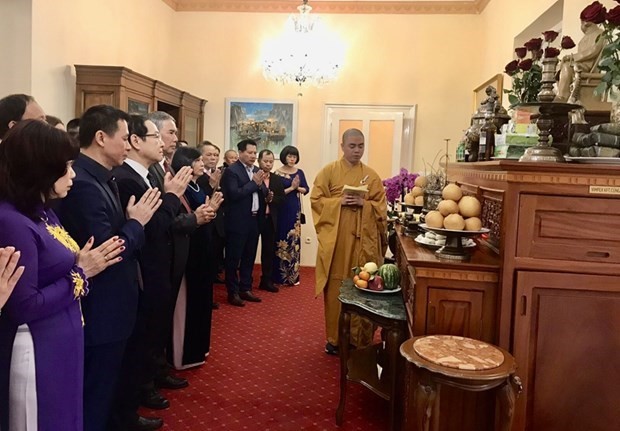
Legendary national founders - Hung Kings - commemorated abroad
Latest
 |
| At the ceremony to pay homage to Hung Kings in Hungary (Photo: VNA) |
In hers remarks at the April 8 event, Ambassador Nguyen Thi Bich Thao highlighted the tradition “When you drink water, remember the source,” as well as patriotism and solidarity of Vietnamese people.
Such traditions have been demonstrated in the citizen protection work, she said, citing that more than 700 Vietnamese evacuated from Ukraine have received the support of the embassy and Vietnamese in Hungary over the past time.
On this occasion, the ambassador presented certificates of merit to collectives and individuals who have made significant contributions to citizen protection.
A similar ceremony was held in Malaysia on April 9, during which Ambassador Tran Viet Thai launched a campaign to raise funds for officers and soldiers in Truong Sa (Spratly) archipelago and DK1 Platform. The fund-raising campaign is scheduled to last until May 15.
Legend has it that Lac Long Quan (real name Sung Lam, son of Kinh Duong Vuong and Than Long Nu) married Au Co (the fairy daughter of De Lai). Au Co then gave birth to a pouch filled with 100 eggs, which soon hatched into a hundred sons. However, soon thereafter, Lac Long Quan and Au Co separated. Lac Long Quan went to the coast with 50 of the children, while Au Co went to the highlands with the rest.
Their eldest son was made king, who named the country Van Lang and set up the capital in Phong Chau (modern-day Viet Tri city in Phu Tho province), beginning the 18 generations of the Hung Kings.
The kings chose Nghia Linh Mountain, the highest in the region, to perform rituals devoted to rice and sun deities to pray for bumper crops.
To honour their great contributions, a complex of temples dedicated to them was built on Nghia Linh Mountain, and the 10th day of the third lunar month serves as the national commemorative anniversary for the kings.
The worship of the Hung Kings, closely related to the ancestral worship tradition of most Vietnamese families, was recognised as part of the Intangible Cultural Heritage of Humanity by UNESCO in 2012.









